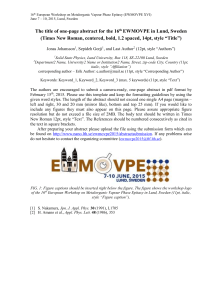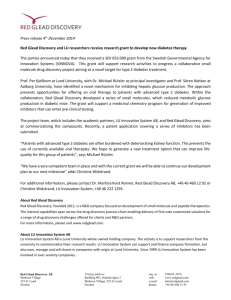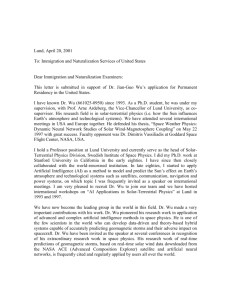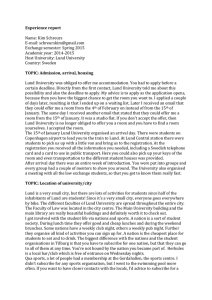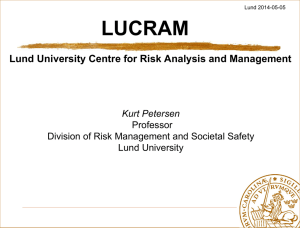Child Rights, Classroom and School Management.
advertisement
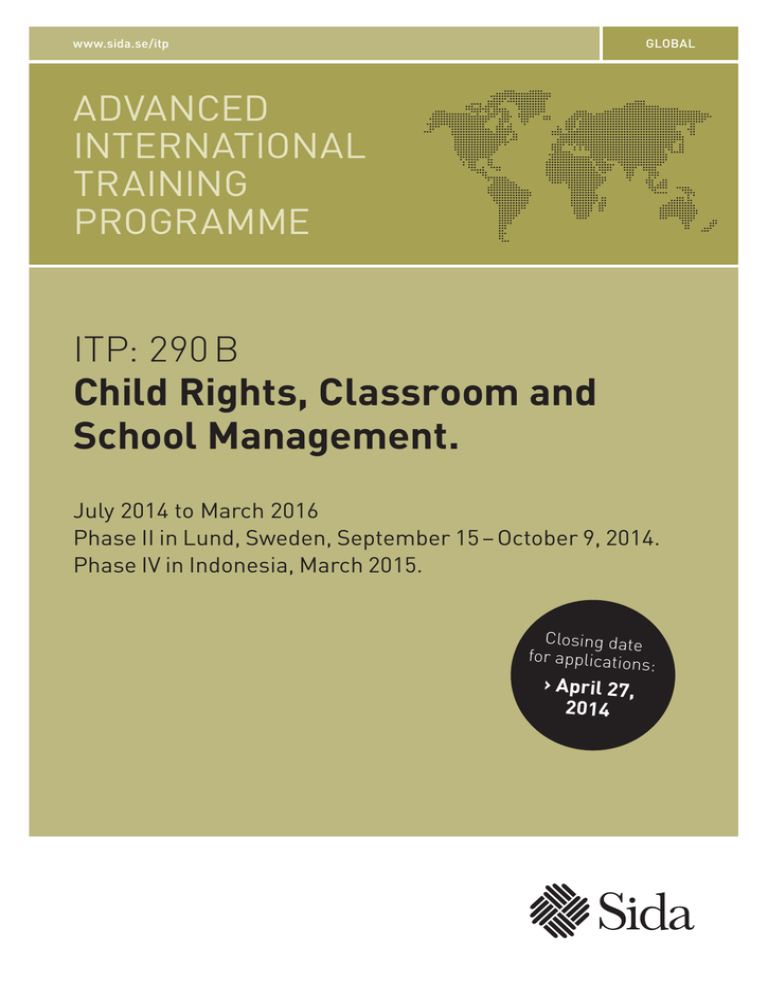
www.sida.se/itp GLOBAL ADVANCED INTERNATIONAL TRAINING PROGRAMME ITP: 290 B Child Rights, Classroom and School Management. July 2014 to March 2016 Phase II in Lund, Sweden, September 15 – October 9, 2014. Phase IV in Indonesia, March 2015. Closing date for application s: › April 27, 2014 INVITATION Welcome This International Training Programme is specially designed for persons qualified to participate in reform processes of importance on different levels and holds a position in home organisation with mandate to run processes of change. It offers support to strengthen, adapt and maintain capacity over time in order for your organisation to define and achieve goals in both the short and long term. A participant will take part of the latest development in your area of work supervised by skilled Swedish colleagues and experts, develop a network of colleagues from other countries and enhance knowledge in new working methods. The methodology used is based on the assumption that your organisation wish to carry out changes and are willing to invest own resources to achieve these changes. In co-operation with Lund University a Human Rights Education (HRE) programme covering Child Rights, Classroom and School Management has been developed. The rights to, in and through education are the guiding principles in the course and the whole training programme has a child rights-based approach. This programme is also designed to give opportunities to compare and share experience with participants from other countries while taking into consideration the Convention of the Rights of the Child, Education for All and other internationally agreed instruments. A rights-based approach has the potential of contributing to the broader efforts of improving educational quality and impact. Schools and classrooms that are protective, inclusive, child-centred, democratic and encourage active participation have the potential to solve problems such as non-attendance, dropout and low completion rates, which are common in developing countries. Child-centred content and teaching learning processes that are adequate to the child’s developmental level, abilities, and learning style promote effective learning. A child rights based approach may also enhance teachers’ capacity, morale, commitment, status and income. Negative attitudes may be altered through the practice of conflict resolution, democracy, tolerance and respect in the classroom. Lund University has conducted the Child Rights, Classroom and School Management programme since 2003, under the auspices of Sida. So far more than 400 change agents have completed the programme. Starting in 2010 the programme has been redesigned after a public tender. The training programme, which is conducted in English, is designed for those holding positions at School, Intermediate and Central level of the education sector. Preferably a team, representing the levels mentioned, consisting of three people from each country should apply. The team is expected to work together throughout the training programme. The number of participants is limited to 30 (from 10 countries) in order to ensure a close working relationship between participants and lecturers. Sida and Lund University Commissioned Education hereby invite you to nominate candidates. Lena Ingelstam DIRECTOR, SIDA Susanne Norrman DIRECTOR, LUND UNIVERSITY COMMISSIONED EDUCATION ADVANCED INTERNATIONAL TRAINING PROGRAMME Programme objectives From a development perspective, the overall objective of the programme is: “to improve participating countries’ capacity to offer and ensure everyone’s right to relevant and quality education, an education that is safe and secure, inclusive, student-centred, democratic and problem-solving and that creates opportunities for all, regardless of background, to participate in community life as active citizens.” The main objective is change processes that will contribute to the realization of the intention of the Child Rights Convention in policy as well as in practice. The specific objectives of the training programme are for the participants to gain: • Increased knowledge and understanding of the CRC. • Increased knowledge and understanding of the Education for All (EFA) and MDGs targets, relevant international concepts such as child-friendly schools, inclusive education and education for democracy and human rights (EDHR) and other relevant international instruments. Contents The rights to, in and through education will be the guiding principles in the programme. The whole training programme has a child rights-based approach. The following topics will be included in the programme: • Policy documents and laws in the subject area related to human rights - CRC, Education for All (EFA) and other internationally agreed instruments of central importance in this context • Key aspects of children’s rights to, in and through education and their practical implications • Democracy in the school and the school’s role in society “citizenship”, inclusive education, gender equality • Opportunities to use Information and Communication Technology (ICT) to promote increased quality and increased access to information and knowledge • Appropriate forms of leadership as well as organizational structures, forms and behaviour and a leaders’ role in the various structures • Difficult situations such as disciplinary measures, bullying, corporal punishment and sexual abuse and possibilities to make a change • Importance of problem solving, critical thinking, participatory approach in the participants context • Education for Sustainable Development as a holistic approach where social, economic and ecological issues are integrated. www.sida.se/itp BENEFITS › Knowledge and understanding of the CRC and related concepts, methods and tools. › Increased understanding and ability to initiate organizational change processes › Sharing experiences through international and national networks • Increased knowledge and understanding of experiences, methods and tools for organizational change in general, and rights-based (participation, inclusive and transparent) and democratic methods and tools for change in particular. • Knowledge and understanding of Swedish and other international methods for translating children’s rights and democratic values into practice in schools and in the classroom. • Expanded international and national networks to work with the CRC and other relevant international conventions and instruments. Programme structure The training programme consists of five phases. The first preparatory phase, takes place before the participants’ arrival in Sweden and it will give all participants a starting point for the programme. During this phase the participants will contact the other team members and start working on an assigned task, relevant for their home country in consultation with a mentor. The second phase takes place in Sweden and it lasts for four weeks. The main content of the second phase will consist of studies in Child Rights, teaching and learning and leadership combined with study-visits to relevant Swedish institutions, including different schools. A project for change which should have a high degree of practical relevance for the participants and their home organisations, will be identified, planned and decided during their stay in Sweden. The third phase consists of working with the project for change with regular assistance from the team’s mentor. The fourth phase consists of a ten day progress workshop in one of the invited countries, this time Indonesia, focusing on the project for change carried out by the country teams. The participants will be asked to develop, discuss and present plans for applying the programme content in their project for change. Study visits to former participants’ existing projects will also take place. Some months after phase four, a follow-up visit will be conducted by the respective mentor in the teams’ home countries. This visit, together with the final report, which is to be written by the teams, constitutes the fifth and last phase. TIMETABLE WHERE: Three of the five phases of the training programme will be carried out in the participants’ home countries. The second phase will be conducted in Lund, Sweden, including a field trip to Stockholm. The fourth phase of the programme will take place in Indonesia. WHEN: The programme runs from July 2014 to March 2016. The phase in Sweden will take place during the period of September 15 – October 9, 2014. The fourth phase of the programme will take place in March 2015. DURATION: The total duration of the programme is 21 months. After having fulfilled all five phases of the advanced training programme the participants will receive a final diploma from Lund University. They will also join a national, regional and global alumni network of Change Agents. The final report of the project for change will be printed in a book. METHODOLOGY The programme comprises lectures, workshops, discussions, study visits, mentoring and project for change. The project for change is the base for the whole training programme and will go on during the whole period of the training programme. The project will be carried out in teams consisting of three participants from each country. MANAGEMENT AND STAFF The training programme is offered by Lund University in Sweden. It is an interdisciplinary programme with staff from the departments and units of Sociology of Law, Education and Social Work at Lund University as well as the Faculty of Education and Society at Malmö University. ACCOMMODATION In Sweden all participants will be accommodated at Hotel Sparta in single rooms with shower and toilet. At Hotel Sparta participants have access to a kitchen with a fridge, storage space and cooking facilities. During phase IV accommodation at a three or four star hotel will be offered. Due to the special character of the programme family members cannot accompany to Sweden or the progress workshop. CHILD RIGHTS, CLASSROOM AND SCHOOL MANAGEMENT. Admission requirements INVITED COUNTRIES The following countries are invited to nominate candidates: Africa: Burkina Faso, Egypt, Ethiopia, Liberia, Mali, Malawi, Mozambique, Namibia, Sierra Leone, South Africa, Tanzania, Uganda, Zambia and Zimbabwe Asia: Afghanistan, Bangladesh, Cambodia, China, India, Indonesia, Sri Lanka and Vietnam Latin America: Bolivia and Colombia TARGET GROUP Preferably a team consisting of 3 people from each country representing the levels mentioned below should apply but individual applications are also welcome. The target groups for the training programme are persons working within the educational sector at three levels: For example • At local level: headmasters, inspectors and educational advisers who are working with the development of methodology and management at school and classroom level in a number of schools (clusters); • At intermediate level: officers and trainers responsible for educational activities at district or province level; • At central level: teacher trainers, headmaster trainers, staff at institutes working with educational development and at Ministries of Education. In addition to the above, the programme will be open to professional NGO staff, working in the field of Education and Human Rights, based in developing countries, as one member of the team. A necessary prerequisite is a university or a teacher training degree. Work experience of at least five years is also required. Participants should be approximately 30-55 years of age and fluent in English. The teams should consist of a mix of men and women and be balanced regarding participants’ ages. Applications should be endorsed by the applicant’s organisation. LANGUAGE REQUIREMENTS The training programme will be organised and conducted in English. Candidates from countries where English is not an official language should do a language test with an official body in the home country, unless other documentation to support for her/his ability can be provided. Proficiency in English shall be certified on the Application form. HEALTH REQUIREMENTS Considering the training programme consists of international travels and work away from home in a new environment, good health and full working capacity is conditioned. It is therefore recommended that candidates undergo a medical examination before filling in the Medical Statement in the Application form. COSTS Sida will cover the costs of: • participation and training such as lectures, literature, documentation, study tours and certain social activities • accommodation including board and lodging, • international travel cost to and from Sweden • international travel cost to and from the progress workshop in Indonesia Costs incurred in travelling to the nearest international airport as well as visa costs are to be paid by the participants. All personal expenses have to be carried by the participants themselves. APPLICATION PROCESS APPLICATION Applications submitted after closing date will not be considered. Application should be written on the attached special form and include a recent photograph and required information and documents. The application should preferably be filled out in the application form on our website http:// www.education.lu.se/sida/child but a hard copy still needs to be printed and signed. The application should be submitted to the nearest Swedish Embassy/ Consulate. If there is no Swedish Embassy/Consulate in the applicant’s country, the application should be submitted directly to the Program Secretariat at Lund University Commissioned Education. When necessary, the application should be approved by the official nominating authority in the country. Selected applicants will be notified by e-mail. Closing date for applications: › April 27th, 2014. VISA Participants are responsible for obtaining all visas and pay all visa costs necessary for their journey and stay during the training programme. The visa should be valid for the whole period of the programme and the passport should be valid for three months longer than the entry visa. INSURANCE All participants are covered by a group insurance while in Sweden and on the organised tours during the programme. This insurance includes costs for medical care in the event of acute illness or accident. Medical and dental checkups are not included. www.sida.se/itp SIDA AND ITP The Swedish International Development Cooperation Agency (Sida) offers, as part of its bilateral development assistance, capacity development activities in areas of strategic importance to the social, environmental and economic development in the participating countries. The purpose of the Advanced International Training Programmes is to provide resources and develop knowledge, skills and expertise to organisations with strong legitimacy in relation to target groups, democracy practices etc. in areas given priority in Swedish development cooperation, are based on identified priorities and needs and in which Swedish expertise is in demand. ORGANIZER Lund University Commissioned Education Att: Emma Alfredsson Box 117 SE-221 00 Lund Sweden Telephone: +46 46 222 0739 Fax: +46 46 222 0750 E-mail: emma.alfredsson@education.lu.se Website: http://www.education.lu.se/sida/child Lund University Lund is situated in south-western Sweden, in the province of Scania (Skåne). The city was founded in the tenth century and still possesses a quaint, old-town atmosphere with winding streets and picturesque houses. Today, the city of Lund has approximately 110.000 inhabitants. Lund University was founded in 1666. Located at the threshold of continental Europe, Lund University is now a major international institution. It is the largest single establishment for research and higher education in Scandinavia, comprising seven faculties (theology, law, medicine, humanities, natural sciences, social sciences, and technology). Approximately 46,000 students, including 3000 post-graduates, are enrolled at the University. A number of research institutions, hospitals, research based industries, libraries and museums are also located on and around the university grounds. Lund University Commissioned Education Lund University Commissioned Education (LUCE) is a division of the university specializing in marketing, sale, quality assurance and administration of commissioned education from Lund University. The university departments are responsible for the content of the training programmes, while Lund University Commissioned Education takes care of the administration of the training programmes. SWEDISH INTERNATIONAL DEVELOPMENT COOPERATION AGENCY Address: SE-105 25 Stockholm, Sweden. Visiting address: Valhallavägen 199. Phone: +46 (0)8-698 50 00. Fax: +46 (0)8-20 88 64. www.sida.se sida@sida.se

